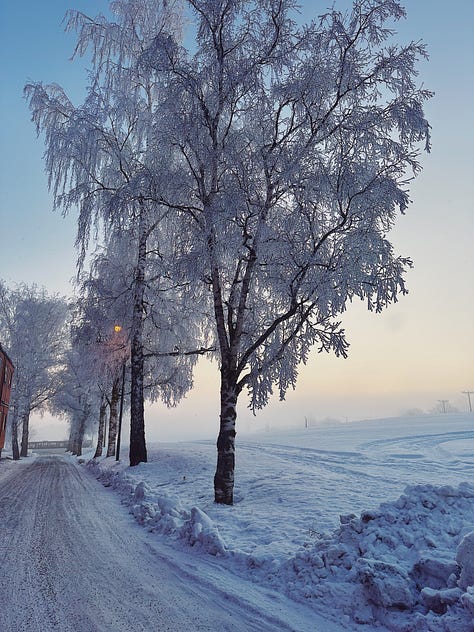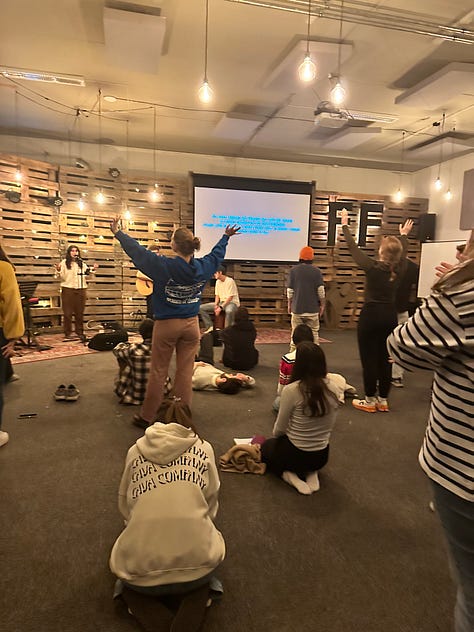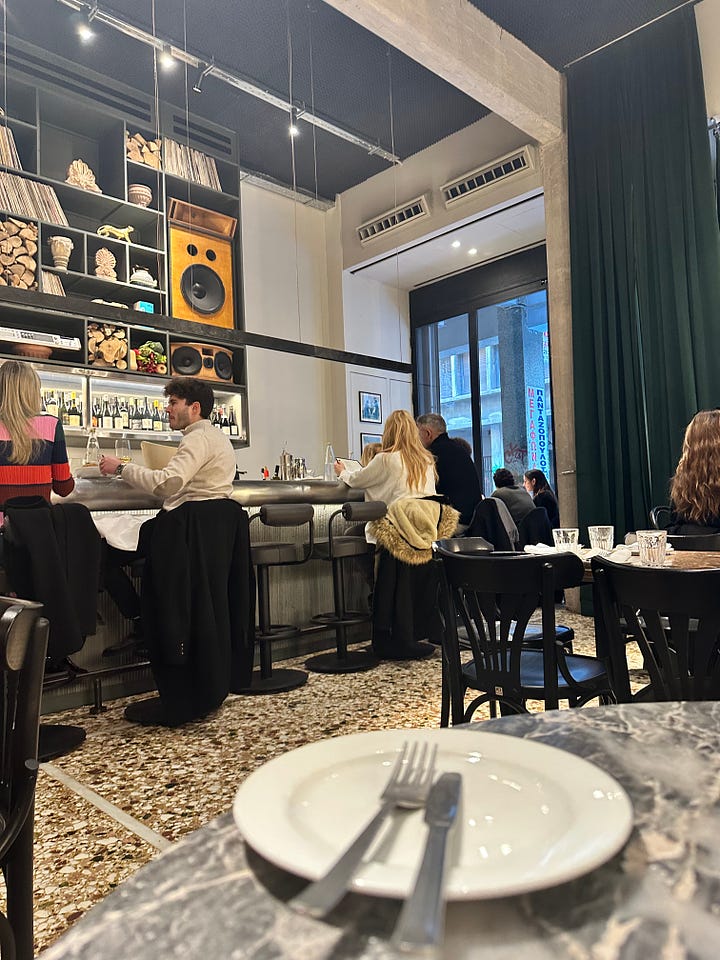The Lectio Letter - Issue #91 - What's Your Calling? | 3 Pieces of Advice
“But Calling, as I see it, is the way God has called you to bear His Image in the World. So in that sense, all human beings share the same calling”
—
“When we give our attention to deepening our life with God (highest calling) and then turn to live out the commands of scripture (common callings), our specific calling emerges as we love and live with God.”
—
“It is worth paying attention to what brings us joy, what makes us come alive and where our desires lay but in the earlier stages of life these are a mixed bag at best. Which is to say, you have mixed motivations, desires and ambitions and while some form of them may be from God, they likely need to be refined and purified.”
—
“Some people struggle to name their calling but operate effortlessly in it, while others never stop talking about it but rarely seem to embody the grandeur of their words. While it can be helpful to clarify our calling over the years of our lives, actually living your life in relationship to the daily direction of the Holy Spirit is the best way to develop in your calling.”
— Excerpts from This Lectio’s Article below
Welcome to Issue #91 of the Lectio Letter. This members-only newsletter is filled with music, film and food suggestions, links, and an article written by yours truly.
This time, I’m sharing 3 pieces of advice I’ve consistently referenced in conversations with people since the beginning of the year.
Inevitably, a new calendar year offers an opportunity to reflect, consider new paths and set a course. With new possibilities, we are also faced with the hum of anxiety about the wrong choice (which I wrote about here in October last year). In previous eras, most people would pick a career path and continue until retirement. Now it seems like every 3-5 years we are faced with decisions about the trajectory of the rest of our lives. How do we go about making and understanding those decisions?
I’ve shared three things in the article below, the first is a way to think about types of calling. The second is understanding where we are in life and how to imagine the relationship between what we need to do vs. what we get to do. Thirdly, I introduce the difference between an assignment and a calling which has been very clarifying for me as I think about what I say “yes” to and how to know when I’m finished.
At the end of the article, I’ve included a list of other articles that I’ve written since I began the Lectio which have something to say around calling, discernment and decision-making. Some of them are only accessible to paying members, but the good news is that you can use the button below to start a trial and read them today!
Whether you become a paid subscriber or not, I’m very grateful to each of you who read and respond to this newsletter.
PSA: This email is LONG and due to some obscure technical reasons on Gmail it gets ‘clipped’, which means you are not seeing the whole thing.
You can see at the bottom of the email if it says “message clipped”, then click “View entire message” to see it all.
You are not getting it all if you don’t see my signature at the bottom.Alternatively, if you don’t want to read this in your email, you can use the substack app (where you can listen to the article read out) or read it online at LectioLetter.com
Status Board
Since I completed the always mammoth task of compiling the yearly book review edition of the Lectio (which if you missed you can read here) we have had a full southern hemisphere summer!
I spent the beginning of the month in Norway for a week teaching at YWAM Grimerud. It was a wonderful time, although moving between 39 centigrade to -18 in under 24 hours was quite an adjustment. I discovered my wardrobe was seriously under-gunned and had to borrow clothes on arrival, but -18c makes for some pretty spectacular scenery.







I was speaking on a DTS which is YWAM’s entry level mission school. It was a stretching experience as I am more experienced in speaking to those who have been in missions a little longer, but they were a delight. There were students from the UK, New Zealand, India, Turkey, the U.S., Denmark, Norway, Israel, The Netherlands and the Faroe Islands.



I was very grateful that Rachel’s parents were able to come and stay with her while I travelled and I could spend a couple of days on either side of the trip with them both.
Work
I mentioned in the last lectio that I was planning to read much more on the Apostle Paul this year. Part of the reason is that we are helping run a seminar for Bible Teachers and Students in YWAM on the Apostle Paul. You can read more about it here.
Reading
These past few weeks I’ve been reading a couple of books which are actually compilations of letters. It’s a great format if you only have short snippets of time to read something;
Letter to a Future Saint
The first is from Brad East who is a fantastic theologian working from Abilene in the U.S. who published a series of letters which began as letters to his young relatives as they prepared to be baptised. These have been developed into short-form catechesis. Catechesis is still practised in some traditions but historically it is the teaching period that runs up to baptism and helps the person who is about to be baptised take in the whole story of God and come to an understanding of what it is they are doing when they put off their old life and put on the new. Brad East does this in an easy to understand way and would deepen mature and early Christians to the nature of our faith and the life that flows from it.
Love Henri
Over the course of his life, Henri Nouwen wrote thousands of letters to friends, acquaintances, parishioners, students, and readers of his work all around the world. He corresponded in English, Dutch, German, French, and Spanish, and took great care to store and archive the letters decade after decade. He believed that a thoughtful letter written in love could truly change someone's life.
This compiled collection of letters from Henri Nouwen is a real treasure. Nouwen is widely beloved as a writer but in many ways struggled through his life as gifted, broken and limited which these letters well attest to. A few things strike me from his letters; 1. He was deeply committed to community and understood he deep reliance on the faithfulness of friends to keep him faithful. 2. He wrestled deeply with his own faithfulness and offered wisdom from his own trials 3. He continually guides people away from the periphery of faith and towards the flesh and blood reality of who Jesus is for us.
One of other reoccurring themes is his continual pursuit of a deepening prayer life and reading these letters for me had the effect of catching that desire in a new way.
Eating
After a very full week in Norway, one of the trip’s great delights was a 6-hour layover in Athens. I jumped straight on the metro and headed for Pharoah, a restaurant Rachel and I loved last year and since then won a bib gourmand from Michelin.
I was sad not to be sharing the experience with Rachel but on the upside, I suspect they thought I was a critic dining alone and I was showered with several ‘complimentary’ tasters. I was in and out within the hour and left stuffed with the most delicious Mediterranean food.







Listening
Now and again, after being in a place like Pharaoh, I daydream of another career. In my dream, I run a coffee shop that sells theology books and scandi homeware (yes, in the real world I’d be bankrupt in 2 months) which transforms into a wine bar that serves pop-up set menus in the evening (as you can tell, I’ve daydreamed a little too consistently about this).
But join me for a moment in my dream as the coffee shop turns into a wine bar, the soundtrack might include sounds like the retro/jazzy/afrobeat tracks I’ve been enjoying below;
What’s your Calling? 3 Pieces of Advice

In the past month, as I suppose is to be expected in the first few months of a new year, I have been in many conversations with younger people about decisions, life direction and a sense of calling. In this Lectio, I would like to share three things that I have been building these sort of conversations around.
1. There Are Different Kinds of Calling.
In circles of ministry, it is common for people to cite a sense of calling. Of course, all people have a calling whether or not they are in "full-time ministry,” but you rarely find a mechanic, surveyor or airline pilot who expresses the sense of their life’s work with this kind of language. But “calling,” as I see it, is the way God has called us to bear His image in the world and, in that sense, all human beings share the same calling as expressed in Genesis 2.
This calling is for humans to faithfully reveal who God is in their actions and relationships. Despite the tragedy of Genesis 3, this calling is sustained by God's faithfulness to a specific people (the Jews) throughout the Old Testament, and then fulfilled (or perfected) by Jesus.
Jesus is the one true human image-bearer who fulfils the human call to be in relationship with the Father for the sake of the world, and so now our high calling is to imitate Him by the power of His Spirit. Although most Christians understand this call to imitate Jesus, we tend to neglect it. I've written in more depth about this before in Lectio #67.
The Puritans spoke of 3 callings:
1. Our Highest Calling: to be in friendship with God.
2. Our Common Calling: the commands of scripture (for example, do not steal, love one another, make disciples etc).
3. Our Specific Calling: the unique calling unique of each person, and very often this can be to a place and a people where we live out the common calling of Christians.
We often fixate on our specific calling because we have absorbed the secular script that "we are what we do," but understanding the 3 callings can offer us a fresh and vital way of seeing our specific calling.
As we give our attention to deepening our life with God (the highest calling) and then turn to live out the commands of scripture (our common calling), we find our specific calling emerges as we love and live with God. Too often our angst for direction and specific calling is present because we haven't attended fully to the first two commands, hoping that the specific calling will fulfil the need in us that is meant to be met in attention to our highest calling.
2. Desire, Discernment, Phase of life and the "Get to Do" versus the "Have to Do."
Ok, I'm cheating here by combining a few different things, but they do have an interrelated nature.
The first thing to say is that discerning how you are uniquely gifted to operate in the world in worship to God and in service of His purposes is an unfolding process. You may catch a glimpse in your younger years of how you are uniquely gifted through having an experience that makes you feel you alive in a certain way, or through a powerful encouragement or prophetic word, but the reality is that most of us are not fully formed to embody our calling well.
It is worth paying attention to what brings us joy, what makes us come alive and where our desires lay, but in the earlier stages of life these are a mixed bag at best. We have mixed motivations, desires and ambitions and while some form of them may be from God, they will likely need to be refined and purified.
One of the ways refining happens is through our character which grows through not getting to do all the things we desire. While it is not an exact science, I have come to observe as true a dynamic I first encountered in Robert Clinton's famous leadership book, "The Making of a Leader," which attempts to chart the growth and development of characters in the bible.
The dynamic is that there are always 2 types of tasks in life. First, the things we have to do but would maybe not choose to. For example, doing the dishes and cleaning the bathroom, working on accounting issues and offering to tidy up after events. Second, the things we get to do and love doing. These may be things that bring us, God, and others delight, things that feel like they fit us and we enjoy or feel energised by doing.
The “get to” type of tasks are good indicators that you might have a specific call embedded somewhere in those types of activities or places. But the reality is that our lives will always have the “have to” kind of tasks embedded in them.
In our earlier years, we can expect that if we were to break down our time spent, more of our lives are spent doing things we “have to” versus things we “get to.” There are several reasons for this, but a core one has to be cultivating character by discovering the value of doing things we don't like to do but need to be done.
Over the years, if our character is growing, we should find ourselves in situations which allow us to do increasingly more of what we enjoy and yet come to value and engage in the things we have to do. I hesitate to be too prescriptive here because there is no such thing as a linear path but I tend to encourage people to consider the following breakdown between have to/get as we move through life:
10-20yrs: 90% / 10%
20-30yrs: 80% / 20%
30-40yrs: 60% / 40%
50-60 yrs: 40% / 60%
60-70 yrs 20% / 80%
70-80 yrs: 10% / 90%
The reality is that from 50 years onwards, I don't think attention to this matters as much because we are hopefully living out our calling with less anxiety than is present in the first half of our life. This is just an exercise to help people understand why, at the age of 20, we don't get to do and be everything we sense we are made to do and be.
The concluding point here is that sometimes people can become so 'helpful' in their area of service within an organisation/community that said organization/community struggles to release them into greater freedom to pursue their calling. These contexts/communities/organisations exist on a sliding scale from well-meaning to outright toxic, and this is a situation that I have counselled several people in. There are few concrete pieces of advice to offer here as each dynamic is unique and deserves careful and prayerful discernment. However, I would say that if we remain connected to healthy, prayerful people outside of our context, they can offer us objective perspectives on our own life and the community we find ourselves in. Having an objective perspective is hard when we are so close to the situation. Perhaps something worth considering might be a gathering similar to a Quaker tradition called a clearness committee.
3. Assignments and Callings
Some of us struggle to name our calling but operate effortlessly in it, while others of us never stop talking about it but rarely seem to embody the grandeur of our words. While it can be helpful to clarify our calling over the years of our lives, actually living our life in relation to the daily direction of the Holy Spirit is the best way to develop our calling. What good is it to hold the deed to a house we own but never live in it. Instead, live in the house well and delight to discover that it is ours.
“Big picture” callings are, by their very nature, dream-like. They are the perfect, big ideas untouched by the complexity and inevitable messiness of everyday life. Very often, a framework, guiding word or some new vocabulary can give you a sense of where you find yourself. One of the most helpful things for me has been clarifying between “assignments” and “callings.”
I identify my own calling as "helping people to see God more clearly so they can deepen their discipleship.” One of the practical ways in which I have done that is to run training programmes. In these programmes, I love to create a curriculum and then to teach and facilitate discussion around the character and nature of God. In the past couple of years, I've been so grateful to have moments to do that but for most of the past ten years, I have been serving in programmes where someone else was doing these things. Instead, I organised airport runs, figured out finances, organised food and pastorally walked alongside people as they participated in the programme.
I wouldn’t describe any of the above as my calling. But they did facilitate a couple of things. First, they helped me gain skills around details and organisation that are needed to run these kinds of programmes. Second, they helped me gain an appreciation for how deeply important these areas of service are. This season was an assignment. I wasn’t fulfilling my deepest sense of calling, but I was in the midst of an assignment observing others who were doing what I one day hoped to do, learning from their successes, challenges and failures. I was also developing a clearer understanding and appreciation of how valuable these often “hidden” services make such environments a possibility.
Now, as I am slowly doing more of what is a good and enjoyable fit for me, others are taking on some of these tasks. To be clear, we don’t serve as a way to qualify for a position of greater leadership. We serve to learn what Jesus-like leadership actually is. We only mature in our calling when we can affirm the value and worth of every contribution.
There are times when God asks us to take on a time-bound assignment that contributes to developing the gifting and character required to fulfil our calling. We don’t always see how it relates but we are aware somehow that God has asked us to serve in a particular way. Much vocational angst and tension comes from not having understood a season of service as an assignment and feeling trapped by it. The key things with an assignment, which are different from a broader calling are:
It usually looks like a very specific-orientated role or action.
There is a sense that God is asking you to engage in it.
There is a time span or clear line when you know you have completed it.
The third point tends to be clarifying for people to reflect on. How would we know we have completed this thing that God called us to? Knowing this for oneself and communicating the sense of it to the people we are working with/on behalf of can create clarity for everyone. It keeps us from suddenly announcing our departure from a role or place without others understanding our sense of commitment.
Conclusion
In defining and clarifying calling, there are few absolutes but the three sections in this article are perhaps my most commonly offered frameworks when I find myself in conversation with young people. If you are interested in delving deeper into calling, I have written a number of articles in the Lectio previously, and a book I highly recommend is, “The Gift of Being Yourself” by David Benner. Foundationally for Christians, vocation is a calling to serve God and others before a pursuit of self-fulfillment, and the words of Jesus remain true in this as in many other places:
“those who give their lives will find them.”
I’d love to hear from you what has helped you in discernment around calling and what you think is missing from the above in the comments.
Links to Other Things I have written on Vocation, Discernment and Decision Making
How to make Decisions - Lectio #87
Understand your unfolding gifting and calling - Lectio #67
The Gift of Failure: How Humiliation helps us find true Humility - Lectio #63
“Shoulds” and “Coulds” - Lectio #60
How (not) to change the world, Part 1 - Lectio #48
How (not) to change the world, Part 2 - Lectio #49
How (not) to change the world , Part 3 - Lectio #50
What is "Kingdom" work? - Lectio #47
You Are Not What You Do | Part II - The Three Callings - Lectio #22
You are not what you do | Part I - Lectio #20
The Mission of God and our attempts to join in - Lectio #14
"We are like God but we are not God..." - Lectio #9
Miscellaneous Links
In a world that is so full of tumult and chaos, I’ve felt increasingly sure that the only way to keep one’s mind and heart open to Jesus is to work to sustain an awareness of the peace Jesus has given us
“Peace I leave with you; my peace I give you. I do not give to you as the world gives. Do not let your hearts be troubled and do not be afraid.”
— John 14:27
Wendell Berry’s Poem, The Peace of Wild Things speaks to this and has been beautifully illustrated through a commission from the On Being Project;
The Least Mature Set the Culture?
Samuel James picks up Mark Sayer’s thoughts on how emotionally immature people can often end up holding the most sway in communities and networks. This is worth reflecting on for anyone involved in the health of communities and institutions.
Change is the only Constant
This is a very perceptive article from Elizabeth Oldfield exploring the tensions between change and stability, or you might think about movements vs. institutions. This is a rarely unpacked dynamic that is all over Christian communities and needs attention. I like her concluding remarks on the nature of trees in relation to this.
A Beautiful painting via Joel Miller on Substack
Someone died and left the US government $7 Billion Dollars — And no one knows who, but there are some clues
Billionaires are like black holes. We deduce their existence from the fundamental laws of capitalism, see their gravity pull politics into their orbit, even detect signals of their existence in the public markets…
…Last year, observers with the economic equivalent of a radio telescope detected a radiating anomaly on the February 28, 2023, daily balance sheet of the US Treasury Department: a $7 billion estate- and gift-tax payment…
The degree by which this payment exceeds others in modern history — it’s not just, ‘Oh, this was the biggest one by 20%,’” Ricco said later. This was the biggest one by a factor of seven.
The data wasn’t erroneous, Treasury officials found, who are legally forbidden to discuss tax filings. But it was a mystery. Who died? And why didn’t they hire better tax attorneys?
It’s not just that this number is an outlier. These days, paying the estate tax is almost optional. Most estates aren’t taxed, and most people with an estate that is taxable — worth more than $13.6 million, or $27.2 million for a married couple — can afford to minimize its impact with careful tax planning and philanthropic largesse. When David Koch, the heir and conservative political activist, died in 2019, his reported $42.2 billion fortune didn’t leave a ripple in the estate-tax data.
Liam Thatcher on Keller Preaching Quote
“For the first 200 sermons, no matter what you do, your first 200 sermons are going to be terrible.” — Tim Keller
I’ve encountered this quote from Tim Keller a good many times, and have found it to be a mixed blessing. On the one hand, it’s hugely releasing to know that you’re not going to be perfect from day one. That learning the craft takes time. That even the great master Tim Keller didn’t come out of the womb preaching perfectly honed sermons. That he also (like I) had dozens of talks in the back catalogue he hoped nobody would ever hear.
But on the other hand, it’s a daunting – even paralysing – quote. Because frankly, many preachers will never make it above 200. Few of us are preaching weekly, at least in my context. Many new preachers will start with one or two a year, and even experienced preachers will often only deliver 15-20 annually. If these figures are correct, then many preachers will simply never have the opportunity for their sermons to be anything other than terrible.










